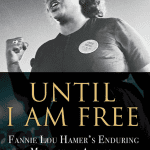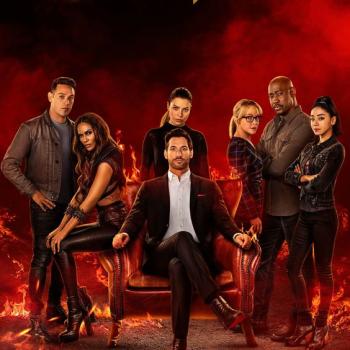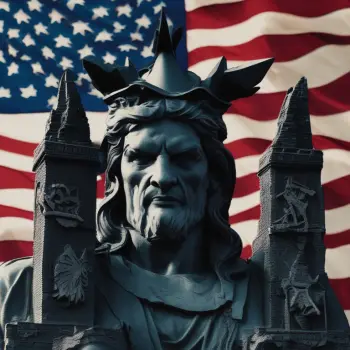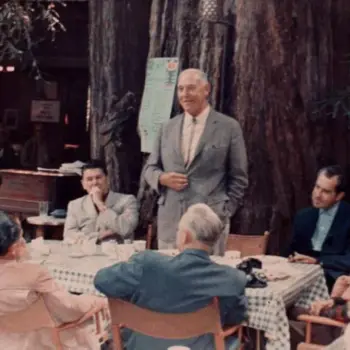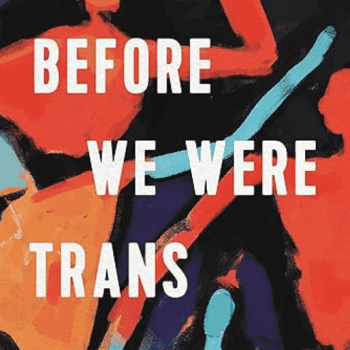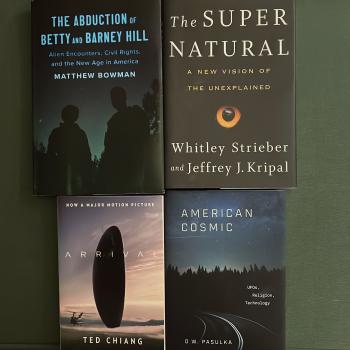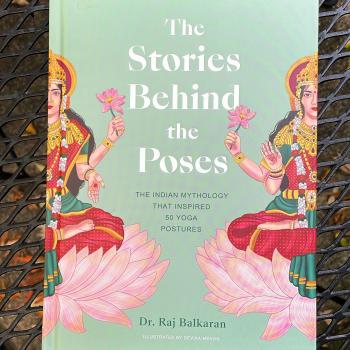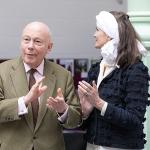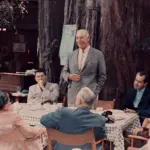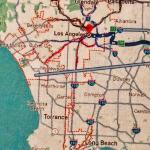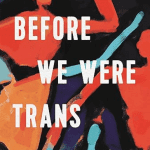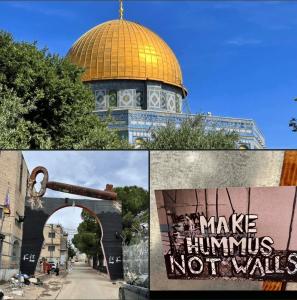 I was recently on an eight-day retreat for meditation teachers near Pisgah National Forest in North Carolina. Because we have an almost five-month old, the only way for me to attend the retreat was to rent a house about twenty-five minutes away in nearby Black Mountain, North Carolina. My mom and my wife took care of our baby during the day, and I drove back each evening to help with our infant overnight and in the morning.
I was recently on an eight-day retreat for meditation teachers near Pisgah National Forest in North Carolina. Because we have an almost five-month old, the only way for me to attend the retreat was to rent a house about twenty-five minutes away in nearby Black Mountain, North Carolina. My mom and my wife took care of our baby during the day, and I drove back each evening to help with our infant overnight and in the morning.
We also brought our dog, and since I’m the only one who can handle walking that maniac, I was in the somewhat unusual circumstance for more than a week of spending a significant part of each day meditating, while also having time each day — on the commute to the retreat center, while walking the dog, and while feeding the baby — to listen to podcasts about the ongoing Israel-Hamas conflict.
On the one hand, incredible natural beauty was all around me, and I had time around a campfire each day with my meditation teacher cohort. On the other hand, I was hearing the daily devastating news from Israel and Palestine.
I hope to offer some reflections that have emerged from meditating on this conflict. I offer them with humility and with some trepidation because this territory is so controversial. My hope and intention — which may or may not be the impact — is for this post to contribute more to healing than harm in this deeply entrenched cycle of violence. In the words of the Buddhist teacher Larry Yang, “May I be loving, open, and aware…. [And] may I not cause harm. If I cannot not cause harm, may I cause the least harm possible” (Rick Hanson, Neurodharma 77).
In that spirit of cultivating loving awareness and healing, I want to invite you to consider four poems over the course of this post. As I have been holding this conflict in my heart, these poems have been particularly resonating with me. Poetry engages not only our heads — the endless rationalizations from the various sides — but also our hearts and spirits.
Poetry is not a luxury. It is arguably essential, even — perhaps especially — during war. When we can’t yet formulate the prose necessary to respond to problems, poems can point beyond words themselves toward yet unforeseen possibilities. As Emily Dickson reminds us:
Tell all the truth but tell it slant —
Success in Circuit lies
Too bright for our infirm Delight
The Truth’s superb surprise
As Lightning to the Children eased
With explanation kind
The Truth must dazzle gradually
Or every man be blind —
So let us turn to the first of the four poems that have particularly been resonating with me the past few weeks. This poem is “Decisions,” by Boris Novak, and it is about making hard choices amidst seemingly impossible circumstances. The most poignant line is
Between two children
choose both.
In the midst of this decades-long conflict, what might emerge if we choose listening — not merely in our echo chambers, but to those we have not yet heard. What happens if between children we choose both? And what happens if we choose hope over despair — even though hope will be harder to bear?
I’m reminded of a quote from the journalist Sarah Kendzior, who has been one of the fiercest and most informed critics of the rise in fascism and authoritarianism in our country and around the world. She writes: “I don’t believe in hope, and I don’t believe in hopelessness. I believe in compassion and pragmatism, in doing what is right for its own sake.”
So, I weep for the more than 1,400 Israelis killed — and many more injured — on October 7th, in the brutal and horrifying Hamas terrorist attacks. And I pray for the safe return of the more than two hundred hostages, including many children. I also weep for the more than 11,000 people killed in Gaza in recent weeks of which more than 4,000 are children. I hold in my heart that approximately half of Gaza’s 2.3 million people are children under the age of 18, who had no chance to vote for or against Hamas, because the last elections in Gaza were held in 2006, seventeen years ago.
I recognize that Israelis feel compelled to do all they can to prevent another terrorist attack on the scale of October 7th, and I also hold in my heart the words of The Rev. Dr. Martin Luther King, Jr. that,
The ultimate weakness of violence is that it is a descending spiral, begetting the very thing it seeks to destroy. Instead of diminishing evil, it multiplies it. Through violence you may murder the liar, but you cannot murder the lie, nor establish the truth. Through violence you murder the hater, but you do not murder hate. In fact, violence merely increases hate…. Returning violence for violence multiplies violence, adding deeper darkness to a night already devoid of stars. Darkness cannot drive out darkness; only light can do that. Hate cannot drive out hate; only love can do that.”
Let me be clear that Dr. King did not mean a weak love. In his words: “Power without love is reckless and abusive, and love without power is sentimental and anemic. Power at its best is love implementing the demands of justice, and justice at its best is power correcting everything that stands against love.”
So, I am listening for the voices who are committed to working together for a future that includes security and dignity for both Israelis and Palestinians. I am listening for the voices who realize on a deep existential level that Jewish lives matter and Palestinian lives matter.
Along those lines, I invite you to hear the second poem of the four poems that have particularly resonated with me the past few weeks. It’s “Red Sea” by the Puerto Rican Jewish poet and activist Aurora Levins Morales; it plays on the metaphor of the biblical exodus, and the fabled crossing of the Red Sea. The most poignant line is “this time…all of us must be chosen.”
As Dr. King said, “We live in an interconnected World House — and we will each learn to live together as [siblings] or we will perish together as fools.” Those are our choices.
In June, I led a group of twenty people on a 10-day pilgrimage to Israel and Palestine. I’m aware now, in retrospect, that Hamas’ attack was being planned while we were there. I traveled to Israel once previously, in 1999, a few months prior to the Second Intifada. That trip was almost exclusively spent in Israel, whereas in June we spent half of our time in Palestine, with a tour group that included both a Palestinian and an Israeli tour guide in dialogue with one another. We visited Hebron, Ramallah, and the Aida Refugee Camp near Bethlehem. We broke bread at a Palestinian Farm, and ate at the home of Issa Amro, co-founder of Youth Against Settlements.
Our three themes for that trip were pilgrimage, perspectives, and peace. which highlights my own general approach to Israel and Palestine:
- Pilgrimage. An old proverb tells us that “A tourist passes through a place, a pilgrim allows a place to pass through them.” Let us not just pass through the news from Israel and Palestine as outside observers. May we be open to having our hearts, minds, and spirits opened in unexpected ways.
- Perspectives — plural. In the spirit of the “dual narratives” approach, we need to listen to people on both sides — and everywhere in between. One of the capabilities that makes me deeply respect someone is hearing them reflect the perspective of the person they are in conflict with in the most charitable way possible. This practice is sometimes called a steel man argument — “the opposite of a straw man argument. Steelmanning is the practice of addressing the strongest form of the other person’s argument.”
- Peace. How can we advocate for a transformation of the Israel-Palestinian conflict which aligns with our UU Sixth Principle, “The goal of world community with peace, liberty, and justice” — not merely for some, but for all?
Many of you know that my wife is Jewish. We have family members who were directly impacted by the Holocaust. Both she and many Jewish people we know have directly experienced the spikes in antisemitism of recent years. Of course, it is possible to criticize specific, unjust policies of Israel without being anti-Semitic, but it is also true that some people and groups have cynically used the Israeli-Palestinian conflict as motivation for cruel antisemitic attacks on Jewish individuals and groups around the world.
A second significant influence on my perspectives is that my primary meditation teacher for many years is Palestinian. In 1948, his grandparents became refugees from Palestine in the events that Palestinians call the Nakba (which means “catastrophe”) and which most Jewish people call Israeli Independence Day. Here we find one of the many divergences within this conflict: what one side celebrates as one of their greatest victories for independence, the other side mourns as one of their greatest losses for the possibility of liberty and self-determination.
Regarding what we can hope to accomplish here today, halfway around the world, I appreciate these words from the Israeli author Yuval Harari, whose bestselling books include Sapiens: A Brief History of Humankind. From his perspective as an Israeli who has deeply studied the long arc of world history and the future potential of our species, Harari writes:
Most Israelis are psychologically incapable at this moment of empathizing with the Palestinians. The mind is filled to the brim with our own pain, and no space is left to even acknowledge the pain of others. Many of the [peacemakers] who tried to hold such a space…are dead or deeply traumatized [from the October 7th terrorist attacks]. Most Palestinians are in an analogous situation — their minds too are so filled with pain, they cannot see our pain. But outsiders who are not themselves immersed in pain should make an effort to empathize with all suffering humans, rather than lazily seeing only part of the terrible reality. It is the job of outsiders to help maintain a space for peace. (Time)
The most frequent analogy I’ve heard in recent days is to the September 11, 2001 terrorist attacks in the U.S. Allow me to lay my cards on the table that in the days after 9/11, my initial reactions were to contact local university professors to organize “teach-ins” on the historic context behind the attacks and to protest against the Iraq War — instincts very similar to mine after October 7th.
In the words of the Jewish journalist Ezra Klein:
Israel’s 9/11 — that’s been the refrain. And I fear that analogy carries more truth than the people making it want it to. Because what was 9/11? It was an attack that drowned an entire country — our country, my country, America — in terror and in rage. It drove us mad with fear. And in response, we shredded our own liberties. We invaded Afghanistan. We invaded Iraq. Our response to 9/11 led to the deaths of hundreds of thousands of innocent people. It made us weaker. It made us poorer. It made us hated around the world. We didn’t pull our forces out of Afghanistan until 2021, 20 years later. And when we left, we did so in humiliation and catastrophe and defeat, abandoning the country to the Taliban. Our politics still haven’t recovered from the ravages of that era.” (The New York Times)
With that awareness, I invite you to hear the third of the four poems that particularly resonated with me over the past few weeks. It was written two weeks after October 7th, and is “the border is the wound” by adrienne maree brown, an activist and author of an number of really interesting and important books on topics like Emergent Strategy, Pleasure Activism, Radical Imagination and Transformative Justice. I invite you to follow that link, and read the poem in full.
Having spent quite a lot of time recently meditating on the Israel/Palestine conflict, let me also share a few insights on what a difference meditation can make for such a time as this. Spiritual practice is not about running away from the problems of the world. That’s spiritual bypassing. Instead, spiritual practice prepares our hearts, minds, bodies, and spirits to engage in activism with our whole selves in skillful and wise ways.
Buddhist Geeks, the sangha I am trained in, emphasizes, “Six Ways to Meditate.” It seems profound to me to cultivate:
- Concentration – to stay focused when the news threatens to scatter our attention all over the place
- Mindfulness – to be non-judgmentally aware of all that is happening in real time in the arising and passing away of each present moment
- Heartfulness – to attune our hearts toward loving-kindness, compassion, inclusion, and joy
- Bodyfulness – to be aware of the somatic wisdom of what is arising in our bodies
- Awareness – to open into loving awareness which is always already present
- Inquiry – to drop into our consciousnesses transformative questions like “What do I doubt?” and “What do I love?” which will make more sense when you hear the fourth and final poem.
-
-
I’ve also been reflecting on what the Buddhist tradition calls the “three poisons” of greed/attachment, delusion/ignorance, and hatred/aversion. These three poisons keep us strapped onto the wheel of samara/suffering. They keep us trapped in habitual patterns and locked into cycles of violence.
- Greed / Attachment – greed such as the extremist Israeli settlers grabbing more and more land, diminishing hope for a two-state solution — or extremists like Hamas, through hate and terrorist violence, poisoning our hopes for peace
- Delusion / Ignorance – being aware of only one side of this complex narrative
- Hatred / Aversion – an unwillingness to hear perspectives you don’t already share
The good news is, that in addition to the three poisons, Buddhism also teaches the three antidotes to those poisons: generosity, wisdom, and love — antidotes which are some of our most powerful tools for breaking free from entrenched patterns of harm, and for working toward the liberation of all sentient beings. Can you feel a shift in your heart, body, and spirit as I name the antidotes for these poison? What does it feel like to move from…
- Attachment to Generosity – wanting dignity and security for both myself and others
- Delusion to Wisdom – shifting from the myth of separateness to the realization of interdependence
- Hatred to Love – a willingness to be vulnerable and risk connection across divides
-
Holding in your heart the three antidotes, I invite you to hear my fourth and final poem, a poem I have been sitting with for many years in regard to Israel and Palestine. It’s titled, “The Place Where We Are Right” by Yehuda Amichai.
Amichai was born in Germany in 1924. In 1936, at the age of twelve, he emmigrated to Palestine with his family. And in 1948, he was a soldier in the First Arab–Israeli War. As a result of his experiences, he became an advocate for peace and reconciliation, and was often involved in dialogues with Palestinian poets and writers. This poem was born out of that work for peace. I urge you to follow the link and read that short poem in full.
This kind of conflict has often been described as “Right vs. Right.” Both sides have legitimate claims and legitimate grievances. If you are in the right about your grievances, it is hard to let go. Why should you?! But the resulting dynamic of blame, punishment, and destruction leaves everyone trapped in entrenched, habitual patterns of deep suffering.
One of the most tragic examples of what can happen if you act only from “the place where you are right” happened in 1995, when Israel’s Prime Minister Yitzhak Rabin was assassinated because of his work for peace with the Palestinians. He was shot, not by a Palestinian, but by a right-wing Jewish Israeli who opposed the Oslo Peace Process. That right-wing Zealot could only see “from the place where he was right.”
What might it mean to approach the Israel/Palestine conflict with doubts and loves as our entry points? Love shifting us out of hatred and creating possibilities for generosity to emerge. Doubt shifting us out of delusion toward wisdom.
Ask yourself: What do I doubt? What do I love?
Regarding the spiritual practice of doubt, an old Zen saying puts it this way: “Great Doubt, great awakening. Small Doubt, small awakening. No Doubt, no awakening!”
On the spiritual practice of love, The Rev. Dr. Martin Luther King, Jr. said it this way in his first book, titled Stride Toward Freedom: The Montgomery Story:
Love, means a recognition of the fact that all life is interrelated, all humanity is involved in a single process, and all [humans] are [related]. To the degree that I harm my [fellow human being], no matter what [they are] doing to me, to that extent I’m harming myself. For example, white men often refuse federal aid to education in order to avoid giving the [Black people their] rights. But because [we are all interrelated], you cannot deny [Black] children without harming [white children]. [They are only hurting themselves.]… If you harm me, you harm yourself. Love…is the only cement that can hold this broken community together. When I am commanded to love, I am commanded to restore community, to resist injustice, and to meet the needs of my fellow human beings.”
Dr. King’s final book was titled Where Do We Go from Here: Chaos or Community? That question is deeply relevant to today’s huge question that is Israel and Palestine.
What might King say if he were alive today? His daughter, Bernice King, the CEO of the King Center, speculates that her father might have said something similar to what he said about the Vietnam War:
If we assume that [hu]mankind has a right to survive, then we must find an alternative to war and destruction. In a day when sputniks dash through outer space and guided ballistic missiles are carving highways of death through the stratosphere, nobody can win a war. The choice today is no longer between violence and nonviolence. It is either nonviolence or nonexistence. (King Center Statement)
On the final night of our time in Israel and Palestine this summer, we met with two members of the The Parents Circle – Families Forum (PCFF), a joint Israeli-Palestinian organization of over 600 families, all of whom had lost an immediate family member to the ongoing conflict.
If you spend time listening to both Israeli and Palestinian families who have lost loved ones in this tragedy, it quickly becomes clear that both “Israeli and Palestinian families use virtually the same words to describe their grief.” This shared language around loss can remind us of the common humanity that runs far deeper than any superficial understanding of a conflict — of the common humanity that can build bridges for the future, even between people who have experienced the most devastating losses imaginable.
As Elad, our Israeli tour guide this summer, shared, so much of what keeps the conflict going is that Israelis and Palestinians have so few opportunities to meet each other and share their stories. He has seen again and again that when bringing Israelis and Palestinians together to dialogue, “an enemy is one whose story we have not heard.”
I want to weave in one final framework from my own Unitarian Universalist tradition. We are in the middle of a process as UUs of rewriting our Principals and Sources. This proposed graphic represents our shared values as UUs — with love at the center. In this graphic, you can see the Buddhist “antidotes” to poisons — where love and generosity are explicitly included.
You can also see other values that relate to Israel and Palestine:
- Pluralism – multiple perspectives
- Transformation – the ways that it is now is not how it always has to be
- Equity – “every person has the right to flourish with inherent dignity and worth.”
- Interdependence and Justice – As Dr. King said, “Injustice anywhere is a threat to justice everywhere. We are caught in an inescapable network of mutuality, tied in a single garment of destiny. Whatever affects one directly affects all indirectly.”
In that same spirit of love, the following message, written by a Palestinian to a Jewish friend a few days after October 7th, has been circulating on Twitter:
At these times, I imagine that mainly people are frightened. That we are looking for safety. I have this need to communicate that despite everything that is happening, I love you, and I love you even more, and forever I will. I open my heart my mind my soul to grasp you, to dedicate my life to create a safe place for all of us, for all of you, for me. I am here, I see you, I feel you, and i love you, and nothing that ever happens will erase any compassion I have for you and us, or would fog my vision of each of our pure essence.
We heard similar sentiments from so many of the Israelis and Palestinians we met this summer.
Imagining a future with hope, dignity, and security for both Israelis and Palestinians will require the antidotes of love, generosity, and wisdom — and a shift from one-sided “either/or” thinking to “both/and” thinking, thinking that is deeply invested in a co-created future with hope for all .
Yes, I do believe we need a ceasefire — or a “humanitarian pause” if you prefer. Israel needs to recalibrate its military response away from causing the massive civilian casualties that are sowing poisonous seeds of hatred that will only fuel the cycle of violence. (As one among many alternatives, see the article, “What Israel should do now Israel’s current approach is clearly wrong. Here’s a better way to fight Hamas — and win.”) Hamas, in turn, needs to return its hostages, and provide credible assurances that terrorist attacks will not resume.
Leaders everywhere with influence must urge the respective “sides” to make commitments now that can lead to a lasting peace. To begin, that might look like Israeli leaders rolling back significant numbers of settlements, and Palestinian leaders credibly committing to ending terrorist violence.
I could keep going back and forth with many more examples of all that will be needed for a lasting peace. But the more foundational point is that two peoples who feel deep ancestral ties to the same land and deserve to live in peace and freedom. I will keep listening for those voices committed to working together for a future that includes security, dignity, and human rights for both Israelis and Palestinians. And I will keep listening for the voices who realize on a deep existential level that Jewish lives matter and Palestinian lives matter.


